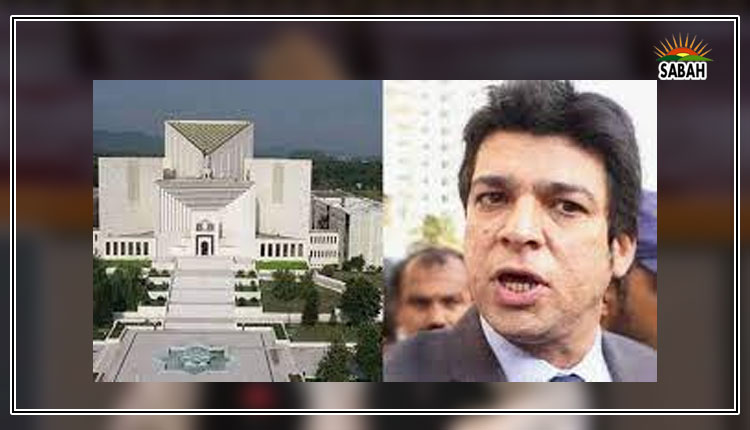Supreme Court revokes Faisal Vawda’s lifetime disqualification after he ‘regrets’ mistake
ISLAMABAD, Nov 25, (SABAH): The Supreme Court of Pakistan (SCP) on Friday set aside the Election Commission of Pakistan’s (ECP) earlier decision of lifetime disqualification for former Pakistan Tehreek-e-Insaaf (PTI) leader and former federal minister Muhammad Faisal Vawda, and disqualified him under Article 63(1)(c) for the current term. Faisal Vawda will remain disqualified till 2023 and is eligible to contest the next general or Senate elections, the court order said.
A three-judge special bench led by Chief Justice of Pakistan Justice Umar Ata Bandial and comprising Justice Syed Mansoor Ali Shah and Justice Ayesha A. Malik, heard Faisal Vawda’s appeal against a decision of the Islamabad High Court (IHC), which had upheld the ECP’s ruling for his disqualification because of dual nationalities.
At the last hearing, the three-member bench headed by the CJP had summoned Vawda to give him a chance to express his regret for misstating his dual nationality before the top court.
“We can call the gentleman to express regrets that he misstated before the court by presenting an affidavit to claim that his sole nationality is Pakistani,” the CJP had said, adding, “If the petitioner acknowledges his mistake, we will leave it to the electorate to decide his fate.”
In the order issued on Friday, the SC bench observed that Vawda stated before the court that he “regrets” the claim of renunciation of US nationality in his nomination papers for elections in Karachi’s NA-249 constituency on June 7, 2018.
“He states he had already applied for such renunciation before the date of filing the nomination [papers]. His certificate for the loss of US nationality was issued to him on June 25, 2018,” the court order read, adding that as a result of the difference of dates, he was disqualified from contesting elections under Article 63(1)(c).
Consequently, an “erroneous statement” was made in the affidavit he submitted regarding his dual nationality to the returning officer, the court observed.
The matter was also addressed during the hearing when Justice Shah asked Vawda about the dates of the issuance of the renunciation certificate and his resignation from the National Assembly (NA).
Vawda told the court that the certificate was issued on June 25, 2018 while he vacated his NA seat on March 30, 2021.
“You remained a member of the NA for three years,” the CJP then said, adding that the court’s did not intend to summon and embarrass him “but you misled everyone for three years”.
The CJP directed him to apologise before the court and say that he was resigning as a senator.
“If you apologise and resign with good intent, the disqualification will be for five years. Otherwise, proceedings under Article 62(1)(f) will be carried out,” the CJP told Vawda.
According to Article 62(1)(f) of the Constitution, a person shall not be qualified to be elected or chosen as a member of Majlis-e-Shoora (Parliament) “unless — he is sagacious, righteous, non-profligate, honest and ameen, there being no declaration to the contrary by a court of law”.
Following the CJP’s remarks, Vawda stated before the court that he was tendering an “unconditional apology”. He said he did not intend to give a false statement and would accept the court’s decision.
Subsequently, the court observed in its order that “he (Vawda) regrets and accepts that he stands disqualified from the term of the assembly until 2023,” the court order said.
The order said although Vawda was elected as a senator in 2021, in order to demonstrate good faith, he was resigning from the Senate seat until the period of his disqualification expired.
“In view of the said statement, the petitioner has submitted his signed apology.”
The court directed Vawda to submit his resignation to the Senate chairperson and concluded that he was qualified to contest the next general or Senate elections.
Speaking to the media after the hearing, Faisal Vawda maintained that he had committed a “legal error”. “I committed a mistake legally. The court, too, has used the word error. It means it was a legal error,” he said. “I have been served justice, and I will resign [from the Senate] gracefully”,
Vawda also claimed that the CJP and his bench had said in their remarks that he had “shown character, grace, and inspiring confidence. “This, coming from the Supreme Court’s highest panel, is an achievement for me in life.”
He went on to say that the SC had declared the ECP’s and Islamabad High Court’s orders regarding his disqualification “null and void”.
In response to a question, he said he had a relationship of “love and respect” with PTI chief Imran Khan and his association with him would continue.
He also denied that he was joining any party in the near future. “I am not joining any party for now. My politics may end here or it may go further. But I have this clarity that I am not joining any party.”
In February, the Election Commission of Pakistan had disqualified Faisal Vawda for life over concealing his dual nationality at the time of participating in the National Assembly election on a Karachi seat during 2018 General Elections.
The commission had also declared the vote which Vawda had cast in the Senate elections on March 10 as MNA “invalid”. Vawda had submitted a false affidavit with his nomination papers, ECP stated.
Later, the former PTI leader moved the Islamabad High Court (IHC) against the ECP verdict. However, the high court rejected his plea and upheld the decision of his lifetime disqualification.
Subsequently, Vawda filed a petition with the top court, arguing that ECP did not have the jurisdiction to disqualify him as a member of parliament.
During Friday’s hearing, CJP Bandia asked Vawda to admit his mistake and face one-time disqualification, otherwise the top court will initiate proceedings under 62(1)(f) of the Constitution.
The chief justice remarked that the court has enough material to disqualify Faisal Vawda for life if he did not accept his mistake.
After the former PTI leader admitted his mistake, the top court revoked his lifetime disqualification.












